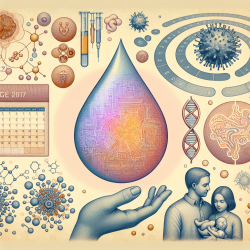The world of autism research is vast and ever-evolving. A recent study titled "Elevated protein concentrations in newborn blood and the risks of autism spectrum disorder, and of social impairment, at age 10 years among infants born before the 28th week of gestation" offers groundbreaking insights that could reshape early intervention strategies for autism spectrum disorder (ASD) and social impairments.
The Study: A Closer Look
This research, part of the ELGAN study, focused on children born extremely preterm (before the 28th week of gestation). These children are at a significantly higher risk for ASD and other social impairments compared to their full-term counterparts. The study explored the relationship between inflammation-related proteins in newborn blood and the development of ASD or high scores on the Social Responsiveness Scale (SRS) at age 10.
Key Findings
- Inflammation-Related Proteins: Elevated levels of certain proteins, such as serum amyloid A (SAA) and interleukin-6 (IL-6), were linked with increased ASD risk.
- Neurotrophic Proteins: High concentrations of neurotrophic proteins appeared to moderate the risk associated with inflammation-related proteins.
- SRS-Defined Social Impairment: High levels of tumor necrosis factor-alpha (TNF-α) were associated with social impairments when neurotrophic protein levels were low.
Implications for Practitioners
The findings from this study have significant implications for practitioners working with preterm infants. By understanding the role of specific proteins in newborn blood, professionals can better assess the risk of ASD and social impairments. This knowledge can guide early interventions that may mitigate developmental challenges later in life.
Steps for Implementation
- Early Screening: Incorporate blood protein level screenings into routine assessments for preterm infants to identify those at higher risk for developmental issues.
- Interdisciplinary Collaboration: Work closely with pediatricians, neurologists, and therapists to develop comprehensive care plans for at-risk infants.
- Pursue Further Research: Encourage ongoing research into the mechanisms linking protein levels with developmental outcomes to refine intervention strategies further.
A Call to Action
This research underscores the importance of early detection and intervention in managing ASD and related social impairments. Practitioners are encouraged to integrate these findings into their practice and advocate for further studies that explore these crucial connections. By doing so, we can enhance our understanding and improve outcomes for children born preterm.
If you're interested in delving deeper into this research, I highly recommend reading the original paper. To read the original research paper, please follow this link: Elevated protein concentrations in newborn blood and the risks of autism spectrum disorder, and of social impairment, at age 10 years among infants born before the 28th week of gestation.










